Annapolis, MD; August 4, 2025—The Governing Board of the Entomological Society of America (ESA) has elected nine new Fellows of the Society for 2025. Election as a Fellow of ESA acknowledges outstanding contributions to entomology via research, teaching, extension, administration, military service, or public engagement and science policy.
The entomologists named 2025 Fellows of the Entomological Society of America are:
- Joanna C. Chiu, University of California Davis
- Laura C. Harrington, Cornell University and Northeast Regional Center for Excellence in Vector-Borne Diseases
- John Heraty, University of California, Riverside
- Margaret M. Mayfield, University of Melbourne
- Robert K.D. Peterson, Montana State University
- Paula Shrewsbury, University of Maryland
- Andrew V. Suarez, University of Illinois
- Michael Ulyshen, USDA Forest Service
- Jessica Ware, American Museum of Natural History
This year's honorees will be recognized during Entomology 2025, November 9-12, in Portland, Oregon.
 Joanna C. Chiu, Ph.D., professor of entomology and nematology at the University of California (UC) Davis, was elected as a Fellow in 2025. She is internationally recognized for her research on the molecular and cellular mechanisms that regulate circadian and seasonal biology and on invasive species genomics.
Joanna C. Chiu, Ph.D., professor of entomology and nematology at the University of California (UC) Davis, was elected as a Fellow in 2025. She is internationally recognized for her research on the molecular and cellular mechanisms that regulate circadian and seasonal biology and on invasive species genomics.
Chiu is a native of Hong Kong. After high school, she moved to the United States to pursue higher education. She obtained her B.A. magna cum laude in biology and music at Mount Holyoke College, Massachusetts, and her Ph.D. in biology with a focus in molecular genetics at New York University with Gloria Coruzzi, Ph.D. She performed her postdoctoral research with Isaac Edery, Ph.D., at the Center for Advanced Biotechnology and Medicine, Rutgers University, in New Jersey. In 2010, she started her independent laboratory at the UC Davis Department of Entomology and Nematology as an assistant professor. She was promoted to associate professor in 2016 and to full professor in 2021. She served as vice chair of the UC Davis Department of Entomology and Nematology from 2016 to 2023 and became chair of the department in 2023.
The Chiu Laboratory investigates the molecular and cellular mechanisms that regulate insect circadian and seasonal rhythms. Biological rhythms are regulated by the endogenous timers and are critical for organismal adaptation to daily and seasonal changes in their environment. Chiu's research contributed to the understanding of the post-transcriptional/translational mechanisms that regulate the animal circadian clock, the mechanisms that enable the interpretation of environmental and metabolic signals to regulate circadian and seasonal rhythms, and the role of the circadian clock in seasonal adaptations. Her laboratory also leverages genomic approaches to study insect invasion biology and insecticide resistance development with the goal of developing new strategies for controlling agricultural pests.
Chiu received the U.S. National Institutes of Health Pathway to Independence Award in 2008, the UC Davis Chancellor's Fellowship in 2018, and the Entomological Society of America Physiology, Biochemistry, and Toxicology Research Award in 2019. She is currently president-elect of the Society for Research on Biological Rhythms (SRBR) for 2024-2026 and will serve as president of SRBR in 2026-2028.
In addition to her research program, Chiu is dedicated to training the next generation of scientists. She was awarded the 2022 UC Davis Academic Senate Distinguished Teaching and Mentoring Award for her contributions to graduate and professional mentoring, the 2023 UC Davis Chancellor's Award for Excellence in Mentoring Undergraduate Research, and the 2024 Pacific Branch Entomological Society of America Distinction in Student Mentoring Award. She has been serving as the director of the NIH-funded Postbaccalaureate Research Education Program at UC Davis since 2022 to facilitate successful transition of trainees from undergraduate to graduate education. Finally, together with colleagues in her department, she co-founded and co-directs the Research Scholars Program in Insect Biology, a long-term mentored research program for undergraduates that has now trained more than 140 undergraduate researchers.
Laura C. Harrington, Ph.D., is a professor and former chair of Cornell University's Department of Entomology. An internationally recognized leader in medical entomology, Harrington's research focuses on critical gaps in the biology, ecology, and behavior of arthropods that transmit human pathogens. She also is an award-winning mentor and teacher, offering courses at Cornell University in the fields of vector biology and global health. Harrington was designated an ESA Fellow in 2025.
Harrington grew up on a farm where there was an abundance of insects to discover. As a young 4-H member, she learned to build an insect collection. She earned her M.S. in entomology from North Carolina State University and then worked in industry as an agricultural biologist developing biorational pesticides for BASF. Realizing that she wanted to learn more, Harrington earned her Ph.D. in entomology from the University of Massachusetts in 1999, when she moved to the University of California at Davis for postdoctoral training. Harrington spent several years of graduate school living and working in rural Thailand, where she contracted both dengue and malaria. The experience increased her resolve to work toward identifying new ways to reduce disease burden. In 2001, she joined the Cornell entomology faculty as an assistant professor and was promoted to full professor in 2013.
Harrington has published more than 123 peer-reviewed articles. To date, she has garnered more than $29 million in extramural funding to support her program. Her pioneering research has advanced our understanding of mosquito biology and disease transmission. Notably, her studies on Aedes aegypti—the mosquito that spreads dengue, Zika, and yellow fever—have revealed how their preference for human blood feeding accelerates disease transmission, helping explain its high efficiency as a vector. Her research on mosquito dispersal guided public health responses during the 2016 Zika outbreak in Florida and internationally. Harrington's research also has advanced understanding of mosquito reproductive physiology and fitness.
As director of the Northeast Regional Center for Excellence in Vector-Borne Diseases (NEVBD) since 2016, Harrington has strengthened the workforce pipeline in public health entomology across the Northeast. Under her leadership, NEVBD has trained thousands of students and professionals in vector surveillance and control and published numerous peer-reviewed papers and technical reports, toolkits, and training resources. Harrington created a unique M.S. program in vector-borne diseases and public health, the first U.S. regional insecticide resistance monitoring service, and an intensive "Vector Biology Boot Camp" to train public health practitioners—initiatives that have become hallmarks of the Center's mission.
An ESA member since 1990, Harrington has served the society as a Journal of Medical Entomology subject editor for nearly a decade, the Section D/MUVE secretary (2006), and a member of two committees: the Young Investigator Award Committee (2008-2017) and the Early Career Innovation Award Committee (2008-2010). She is an active member of the Vector-Borne Disease Network, led by ESA, to advocate for vector-borne disease funding.
Harrington lives with her husband, Sam, and their two Siamese cats near Ithaca, New York. They enjoy playing music together, hiking, fishing, and spending time with family.
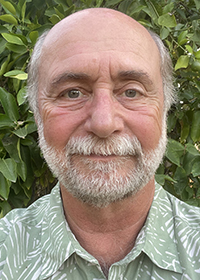 John Heraty, Ph.D., is professor of entomology at the University of California, Riverside (UCR). His research is on the evolution and classification of minute parasitic wasps belonging to the superfamily Chalcidoidea, many of which are important biological control agents with direct agricultural relevance. His scientific love is the ant-parasitic family Eucharitidae.
John Heraty, Ph.D., is professor of entomology at the University of California, Riverside (UCR). His research is on the evolution and classification of minute parasitic wasps belonging to the superfamily Chalcidoidea, many of which are important biological control agents with direct agricultural relevance. His scientific love is the ant-parasitic family Eucharitidae.
Heraty was born in Toronto, Ontario. He received his B.S. (1976) and M.S. (1984) degrees from the University of Guelph. From 1976 to 1986, he worked as a biological control research technician. He left that position for a Ph.D. with James Woolley, Ph.D., at Texas A&M University, graduating in 1990. He then held a Canadian NSERC postdoctoral fellowship at Carleton University and the Canadian National Collection in Ottawa. In 1993, he held a fellowship at the Smithsonian Institution and then a postdoctoral position at the USDA-SEL lab. He started at UCR in 1995 and was promoted to full professor in 2005.
His years as a biological control technician introduced him to both the amazing diversity of chalcid wasps, as well as their importance in the control of other insects. During that time, Lubomir Masner, Ph.D., showed him a vial of Eucharitidae from Trinidad, and that was all it took to divert him to the world of taxonomy, classification, and phylogenetics. Over his career, Heraty continued to study these odd parasitic wasps and describe new species and genera, document their immature stages and ant-host associations, and place this all within a phylogenetic framework using everything from morphology to advanced molecular techniques. He was an early pioneer in the higher classification of Chalcidoidea using molecular data, with a first paper in 1999 using 28S-D2 for a mere 109 species. In 2024, in collaboration with Jean-Yves Rasplus, Ph.D., a new phylogeny of Chalcidoidea was published with 433 taxa and 2054 loci using a combination of Anchored Hybrid Enrichment and ultraconserved elements. The results were used to revise the classification of Chalcidoidea and form the foundation for a new book, Chalcidoidea of the World, co-authored with Woolley in 2025.
Heraty has been a major advisor to 13 Ph.D. students, six M.Sc. students, and seven postdoctoral researchers and mentored a large number of undergraduate students. He is proud of the diversity of students supported in his laboratory, with a large number being women, Hispanic, African American, and Native American. In support of students, he has been the fundraiser for the ESA SysEB Graduate Student Travel Award (please donate) and initiated an undergraduate research experience endowment for entomology at UCR.
Heraty is a past Section A (SysEB) chair and a Governing Board member for ESA. He received numerous NSF awards that transformed our knowledge of Eucharitidae and Chalcidoidea, but all this could only have been done in collaboration with numerous excellent researchers. He is driven by a continued passion for field work, sampling his eucharitid wasps in more than 20 countries, with more to come.
He shares his life with Christiane Weirauch, and he has a wonderful daughter, Joanne, and grandson, Carson.
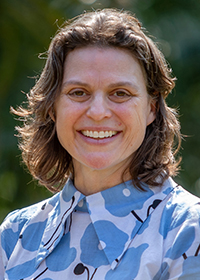 Margaret M. Mayfield, Ph.D., is a plant and insect community ecologist dedicated to understanding the intricate relationships between plants and insects within the context of whole communities. She has worked across the Americas and Australia, in rainforests, monsoonal savannah, Mediterranean woodlands, and agricultural fields. Her research focuses on how plants and beneficial insects, particularly pollinators, mediate changes in the structure, function, and diversity of plant communities under human-induced environmental pressures.
Margaret M. Mayfield, Ph.D., is a plant and insect community ecologist dedicated to understanding the intricate relationships between plants and insects within the context of whole communities. She has worked across the Americas and Australia, in rainforests, monsoonal savannah, Mediterranean woodlands, and agricultural fields. Her research focuses on how plants and beneficial insects, particularly pollinators, mediate changes in the structure, function, and diversity of plant communities under human-induced environmental pressures.
Mayfield started her career with an undergraduate degree in biology from Reed College in Oregon. Her interest in pollinators and pollination developed during this time, due to a series of internships on pollination at the Rocky Mountain Biological Laboratory in Colorado, the Archbold Biological Station in Florida, and the Starr Ranch Audubon Sanctuary in Southern California.
Building on her undergraduate studies of pollination, Mayfield was awarded a Thomas J. Watson Fellowship in 1999 to investigate the interactions between farmers, Indigenous communities, and beneficial insects across 17 countries worldwide. This experience solidified her commitment to studying pollinators and their critical role in ecological systems.
Mayfield went on to complete her Ph.D. at Stanford University, working with Drs. Paul Ehrlich and Gretchen Daily, studying the countryside biogeography of plants in Costa Rica. This work led her to explore what plant functional traits can tell us about the ecology of threatened communities. Her work on plant pollination and dispersal traits, in particular, advanced the understanding of how changes to plant communities resulting from human land management activities impact insect communities and the ecological processes on which plants and insects depend.
Throughout her career, Mayfield has studied the impacts of micro- to landscape-scale environmental factors on plant and insect diversity, with particularly important contributions to our understanding of how environmental changes affect the underlying ecological processes that structure diversity. In recent years, she has also championed the study of noncompetitive interactions and their roles in species coexistence.
Mayfield has also been a leader in advancing ecological theory and developing quantitative tools to enhance our understanding of the mechanisms driving changes in community diversity. Her work has highlighted the importance of considering insect-mediated processes when studying plant community dynamics and ecosystem function.
Mayfield's commitment to insect ecology extends beyond her research to fostering the next generation of insect ecologists. She has trained over 70 young plant and insect ecologists over the past 20 years, many of whom have gone on to successful careers in biosecurity, environmental consulting, and education in Australia, the United States, and Europe. Recognizing the lack of specialized entomology training in Australia, she actively supports her students in pursuing advanced training in the U.S., while also promoting the need for more entomological educational programs in Australian universities.
Through her research, dedicated mentorship, and engagement with Indigenous communities, Mayfield has made significant contributions to our understanding of plant-insect interactions and the crucial role of insects in maintaining ecosystem health and biodiversity.
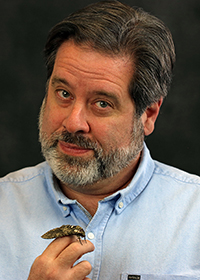 Robert K.D. Peterson, Ph.D., professor of entomology and department head in the Department of Land Resources & Environmental Sciences at Montana State University (MSU), was elected ESA Fellow in 2025.
Robert K.D. Peterson, Ph.D., professor of entomology and department head in the Department of Land Resources & Environmental Sciences at Montana State University (MSU), was elected ESA Fellow in 2025.
Peterson is a native of Perry, Iowa, and has been fascinated with insects since he was 5 years old. He received his B.S. in entomology from Iowa State University in 1987 and his M.S. and Ph.D. in entomology from the University of Nebraska in 1991 and 1995. He was a scientist with Dow AgroSciences from 1995 through 2001. He accepted an associate professor position at MSU in 2002, where he created a novel research and teaching program in agricultural and biological risk assessment. He has published 146 peer-reviewed journal articles, 15 book chapters, and two books. Peterson was tenured in 2006 and promoted to professor in 2011.
Peterson's research career has focused on comparative biological risk assessment. This area was unique within risk assessment circles because his emphasis is on biological and ecological systems rather than just the traditional approach of exposure and hazards. Additional areas of his research emphasis include plant-stress ecophysiology and integrated pest management. Combined, these three areas form a diverse, yet interrelated, research program with important and broad advances for entomology. Peterson is arguably best known for his risk assessment research on comparative risks associated with insect-borne pathogens and management tactics. His lab's foundational paper in this area was published in 2006 in Environmental Health Perspectives, a top environmental science and health journal, and the paper was featured on the cover of the issue. This article was the first to assess the human-health risks of insecticides used to manage adult mosquitoes during the West Nile virus outbreak. More importantly, the paper compared the risks of exposure to insecticides and the risks posed by West Nile virus. He has delivered numerous invited keynote presentations on these topics, and his efforts have culminated in the 2025 Annual Review of Entomology article on IPM and environmental risk.
Peterson has received numerous research awards, including the 2021 Distinguished Faculty Award at MSU, the 2012 Presidential Citation from the American Mosquito Control Association, the 2009 Excellence in Integrated Pest Management Award from the Entomological Foundation, and the 2009 Top 10 Paper Advancing the Science of Risk Assessment from the Society of Toxicology.
Peterson has taught undergraduate and graduate courses, including environmental risk assessment, insect ecology, and various special-topics graduate courses. He also created and directed the professional M.S. program in environmental sciences at MSU.
In volunteer leadership as an ESA member, culminating as president in 2019, Peterson has been passionate about addressing and serving the professional needs of entomologists. As a result, he has mentored numerous members who are recent or current volunteer leaders throughout ESA. In addition, throughout his career he has mentored many professionals in diverse fields.
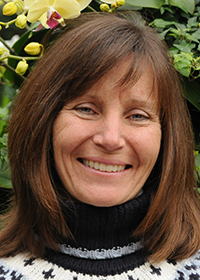 Paula Shrewsbury, Ph.D., professor and extension specialist at the University of Maryland, is widely recognized for developing integrated pest management (IPM) programs for the green industries, biological control of invasive insects, and advancement of sustainable landscapes, nurseries, and turf systems.
Paula Shrewsbury, Ph.D., professor and extension specialist at the University of Maryland, is widely recognized for developing integrated pest management (IPM) programs for the green industries, biological control of invasive insects, and advancement of sustainable landscapes, nurseries, and turf systems.
Shrewsbury earned her B.S. in plant science at the University of Rhode Island and her M.S. in entomology at the University of California, Riverside. Her interest in pests of ornamental plants matured during Ph.D. studies at the University of Maryland. Questions surrounding the ecology of pests and their outbreaks in urban landscapes fueled her passion for biological control. After two years at Rutgers University and a leadership position at the Smithsonian Institution, Shrewsbury joined the faculty at the University of Maryland in 1999. For almost three decades she has worked as an extension IPM specialist. She served as director of graduate students and instructor for several graduate and undergraduate courses, and she led several of the department's award-winning outreach programs.
Shrewsbury's research and educational activities blend seamlessly together to meet the needs of green industry stakeholders, citizens, and graduate and undergraduate students. Three major themes of her programs are 1) increasing the sustainability of managed nursery and urban landscape systems by modifying habitat factors to conserve and enhance beneficial arthropods and ecosystem services they provide; 2) identifying biological control approaches targeting invasive nursery, landscape, turf, and forest pests; and 3) providing research-based information to clientele to inform management decisions using a diversity of educational approaches.
She has more than 160 research and extension publications, reached more than 369,000 professionals and extension personnel attending 732 meetings, and enlightened more than 25,000 children and parents attending the Insect Petting Zoo. Shrewsbury is a co-founder and long-time principal contributor to the University of Maryland Extension IPM weekly newsletter received by more than 10,000 professionals from 23 states annually.
Shrewsbury's contributions to extension, research, and teaching have been recognized at several different levels by many organizations. Shrewsbury was recognized by her peers for her efforts and impacts in extension by the Distinguished Achievement Award in Extension from the national ESA in 2018. She was the recipient of the Eastern Branch's (EB's) Recognition Award in Urban Entomology, the Distinguished Achievement Award in Extension, and ESA Service Award. Shrewsbury's primary stakeholder group presented her team with the award for Outstanding Effort in Integrated Pest Management. The Eighth International IPM Symposium presented Shrewsbury and her co-principal investigators with its International Integrated Pest Management Award of Recognition in 2015 for their research and extension outreach on the brown marmorated stink bug. She has received numerous awards from her university for efforts in teaching and outreach.
Shrewsbury has mentored and advised an impressive group of graduate and undergraduate students as well as six postdocs and visiting scientists.
Shrewsbury has provided outstanding service to ESA at the branch and national level. She served as the EB ESA program chair in 2012, as the EB president-elect and president in 2013 and 2014, respectively, and on the ESA Governing Board from 2015 to 2018. She also served on numerous other ESA committees and activities.
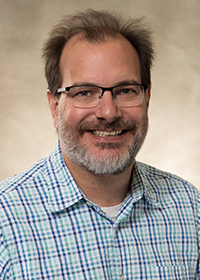 Andrew V. Suarez, Ph.D., professor of entomology and Jeffrey S. Elowe Professor of Integrative Biology at the University of Illinois, was elected Fellow in 2025.
Andrew V. Suarez, Ph.D., professor of entomology and Jeffrey S. Elowe Professor of Integrative Biology at the University of Illinois, was elected Fellow in 2025.
He received a B.S. in ecology, ethology, and evolution in 1991 and an M.S. in biology in 1994 from the University of Illinois. He spent the next nine years in California, where he received his Ph.D. from the University of California (UC) San Diego in 2000, was a USDA postdoc at UC Davis, and was a Miller postdoc at UC Berkeley. In 2003, he returned to Illinois as faculty.
His research program capitalizes on the developmental and ecological flexibility of ants to examine a wide variety of topics, including the causes and consequences of biological invasions, the evolution of body size variation, and the evolution of behavioral and morphological specialization. His recent work has focused on the ecology and biomechanics of trap-jaw ants. Suarez has published more than 100 articles on ants that have accumulated over 20,000 citations.
Suarez has received numerous campus teaching awards for his courses, in which insects are always heavily featured. He was also a co-instructor of the Ant Course, an international field course on ant taxonomy and systematics. His administrative experience at Illinois includes being director of the program in ecology, evolution, and conservation; head of the Department of Evolution, Ecology, and Behavior, and acting head of the Department of Entomology.
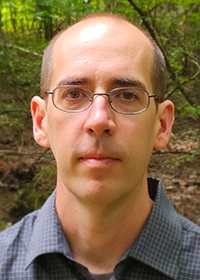 Michael Ulyshen, Ph.D., is a research entomologist with the USDA Forest Service in Athens, Georgia. He is known for his research on pollinators in forests, the diversity and ecology of saproxylic insects, and the contributions of insects to wood decomposition and nutrient cycling.
Michael Ulyshen, Ph.D., is a research entomologist with the USDA Forest Service in Athens, Georgia. He is known for his research on pollinators in forests, the diversity and ecology of saproxylic insects, and the contributions of insects to wood decomposition and nutrient cycling.
Ulyshen grew up in rural Ohio, where he was encouraged by his parents to pursue an early fascination with the natural world. He spent many days observing and collecting insects in forest patches wedged between fields of corn and soybean. Books like The Malay Archipelago and BBC documentaries were his windows to the larger world. He attended nearby Miami University, where he worked half-time in the natural history museum on campus and earned degrees in zoology and chemistry in 2002. He then went to the University of Georgia, where he earned his M.S. in 2006 and Ph.D. in 2009 in entomology under the guidance of James Hanula, Ph.D. His graduate research focused on the impacts of forest management practices on saproxylic beetle diversity. During that time, he also made independent trips to the tropics (French Guiana, Southeast Asia, and Australia) to learn more about the flora and fauna of those regions.
Ulyshen began his first permanent job in 2010 as an entomologist with the Forest Service in Starkville, Mississippi, where he focused on the contributions of termites and other wood-dwelling insects to wood decomposition. He then became a research entomologist, also with the Forest Service, and moved back to Georgia with his wife, Tianyi, and three children, Lauren, Renee, and Russell, in 2014. His work currently focuses on the value of forests to pollinating insects and how those organisms are affected by prescribed fire and other management practices.
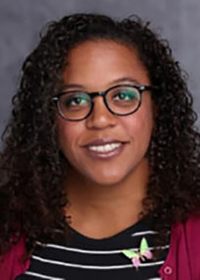 Jessica Ware, Ph.D., is a curator at the American Museum of Natural History, where she serves as chair of the Division of Invertebrate Zoology. Ware's research focuses on the evolution of insects. She studies behavioral and physiological adaptations in different insects, with an emphasis on how these occur in Odonata (dragonflies and damselflies) and Dictyoptera (termites, cockroaches, and mantises). Recently, she was awarded a PECASE medal from the U.S. government for her work on insect evolution.
Jessica Ware, Ph.D., is a curator at the American Museum of Natural History, where she serves as chair of the Division of Invertebrate Zoology. Ware's research focuses on the evolution of insects. She studies behavioral and physiological adaptations in different insects, with an emphasis on how these occur in Odonata (dragonflies and damselflies) and Dictyoptera (termites, cockroaches, and mantises). Recently, she was awarded a PECASE medal from the U.S. government for her work on insect evolution.
Ware served as president of the Systematics, Evolution, & Biodiversity Section at ESA. She served as a director at the Society of Systematic Biologists for three years and on the Entomological Society Governing Board for three years.
Ware is a past president of the Worldwide Dragonfly Association and a past president of ESA. She is the current president of the Society of Systematic Biologists. Ware has published over 100 peer-reviewed publications and several book chapters.
###
CONTACT: Joe Rominiecki, jrominiecki@entsoc.org, 301-731-4535 x3009
ABOUT: ESA is the largest organization in the world serving the professional and scientific needs of entomologists and people in related disciplines. Founded in 1889, ESA today has nearly 7,000 members affiliated with educational institutions, health agencies, private industry, and government. Headquartered in Annapolis, Maryland, the Society stands ready as a non-partisan scientific and educational resource for all insect-related topics. For more information, visit www.entsoc.org.
